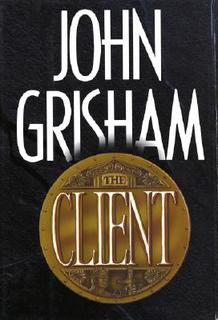The Client (novel)
1993 legal thriller by John Grisham From Wikipedia, the free encyclopedia
The Client is a 1993 legal thriller novel written by American author John Grisham. It is Grisham's fourth novel and follows the story of an 11-year-old boy, Mark Sway, who becomes entangled in a mob-related legal case after witnessing the suicide of a lawyer who knows the location of a murdered U.S. senator’s body. The novel is set primarily in Memphis, Tennessee, and New Orleans, Louisiana.[1]
 First edition cover | |
| Author | John Grisham |
|---|---|
| Language | English |
| Genre | Legal thriller |
| Publisher | Doubleday |
Publication date | 1993 |
| Publication place | United States |
| Media type | Print (hardcover, paperback) |
| Pages | 422 |
| ISBN | 9780385424714 |
| OCLC | 27010248 |
| Preceded by | The Pelican Brief |
| Followed by | The Chamber |
Plot
Summarize
Perspective
Boyd Boyette, a U.S. senator from Louisiana, goes missing after vocalizing opposition to a Mafia-backed toxic landfill project. His disappearance leads the authorities to suspect foul play, but no body is found. Desperate for a breakthrough, Roy Foltrigg, a federal U.S. attorney, focuses on Barry "The Blade" Muldanno, a notorious thug and nephew of Johnny Sulari, the acting boss of the New Orleans Mafia. The FBI monitors Muldanno, hoping he will lead them to Boyette's body.[2]
Meanwhile, 11-year-old Mark Sway and his younger brother Ricky stumble upon Jerome Clifford, a lawyer, attempting suicide. Before killing himself, Clifford reveals to Mark that Muldanno has hidden Boyette's body and that he fears being murdered by the Mafia. Mark escapes, but Ricky becomes catatonic after witnessing the traumatic event and is hospitalized. Both the FBI and the Mafia suspect Mark knows where Boyette's body is located, making him a target.[3]
To protect himself, Mark seeks the legal help of Regina "Reggie" Love, a lawyer who specializes in child protection cases. Reggie helps Mark navigate a dangerous legal battle, representing him in interviews with the FBI while he faces threats from Mafia operatives. Foltrigg pushes aggressively to force Mark to reveal the body's location, but Mark remains resolute in his refusal.[4]
Mark is placed in juvenile detention for his own protection and is brought before a judge, where he still refuses to divulge what he knows. Eventually, the Sway family agrees to enter the witness protection program to escape the Mafia's reach. Before leaving, Reggie finally reveals the location of Boyette's body to the FBI, securing the safety for Mark and his family.[2]
Character analysis
Summarize
Perspective
Mark Sway
Mark Sway serves as the protagonist of the novel, and through his character, Grisham explores the vulnerability and moral strength of a child thrust into an adult world of legal intricacies and criminal dangers. Mark is depicted as street-smart, independent, and resourceful, traits that make him a moral force within the novel, akin to Huck Finn from Mark Twain's work. As noted by scholars, Grisham’s portrayal of Mark situates him among literary adolescents like Holden Caulfield and Huck Finn, where the young protagonist must navigate complex moral and societal landscapes.[5]
Regina "Reggie" Love
Reggie Love is a 52-year-old lawyer who represents Mark and acts as a counterbalance to the aggressive tactics of Roy Foltrigg. A survivor of divorce, substance abuse, and an emotional breakdown, Reggie is depicted as an empathetic and resilient character. She becomes a maternal figure for Mark, advocating for his rights while respecting his fear of the legal system. Scholars have highlighted Reggie's character as an example of 1990s feminism, where her role as an independent woman overcoming personal hardship plays into Grisham’s broader critique of traditional gender roles.[6]
Roy Foltrigg
Roy Foltrigg, the ambitious U.S. Attorney, serves as the novel's primary antagonist. His desire to convict Muldanno is driven more by personal ambition than by a sense of justice. Scholars have critiqued Foltrigg as embodying the darker side of the legal system, where justice is sacrificed for personal gain. His aggressive, masculine approach contrasts with Reggie's more empathetic and nuanced method of handling the case.[6]
Themes
The Client explores themes of childhood vulnerability, justice, and ethical dilemmas within the legal system. Grisham's depiction of Mark, a child caught between the criminal underworld and the legal system, serves as a critique of how society handles young witnesses. The novel also raises questions about attorney-client privilege, as Reggie grapples with her ethical responsibility to protect Mark while fulfilling her legal obligations. In this sense, Grisham presents a nuanced exploration of the legal profession's moral complexities.[6]
The environmental backdrop of the novel—Boyette’s opposition to a Mafia-controlled toxic landfill—adds another layer to Grisham’s critique of corruption and corporate greed. By intertwining environmental concerns with legal intrigue, Grisham broadens the novel's scope, connecting personal justice with broader social issues.[2]
Critical reception
The Client received mixed to positive reviews. Kirkus Reviews praised its fast pace and suspense, calling it "gripping" and "filled with tension." However, some critics, like those from the Chicago Tribune, found the novel's pacing uneven, noting that while the opening chapters hooked readers, the middle sections felt "plodding." Despite these critiques, the novel’s commercial success solidified Grisham’s reputation as a master of legal thrillers.[7]
Scholars have noted Grisham's ability to merge legal suspense with social commentary. According to Wolfgang Funk, The Client stands out for its moral complexity, where the protagonist’s struggle mirrors larger societal concerns about justice, ethics, and child protection.[6]
Adaptations
In 1994, The Client was adapted into a successful film directed by Joel Schumacher, starring Susan Sarandon as Reggie Love and Tommy Lee Jones as Roy Foltrigg. Sarandon received an Academy Award for Best Actress nomination for her role, and the film was praised for its performances and suspense.[8] The success of the film led to a television series adaptation (1995–1996), starring JoBeth Williams and John Heard.[9]
References
Wikiwand - on
Seamless Wikipedia browsing. On steroids.
